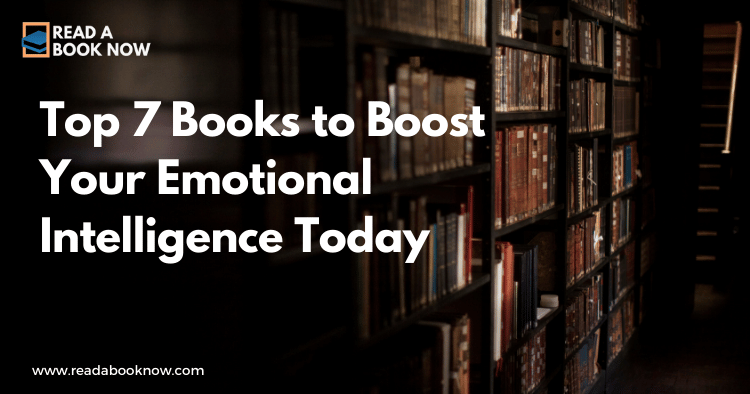Table of Contents
- Introduction
- What is Emotional Intelligence?
- Why is Emotional Intelligence Important?
- Top 7 Books to Boost Your Emotional Intelligence
- 1. “Emotional Intelligence 2.0” by Travis Bradberry and Jean Greaves
- 2. “The Emotionally Intelligent Manager” by David R. Caruso and Peter Salovey
- 3. “Dare to Lead” by Brené Brown
- 4. “The Art of Happiness” by Dalai Lama and Howard Cutler
- 5. “Working with Emotional Intelligence” by Daniel Goleman
- 6. “Emotional Intelligence: Why It Can Matter More Than IQ” by Daniel Goleman
- 7. “The Language of Emotions” by Karla McLaren
- FAQs About Emotional Intelligence
- Conclusion
Introduction
Emotional intelligence (EI) has become a buzzword in personal and professional development. But what does it truly mean, and why should you care? In this blog post, we’ll explore the essence of emotional intelligence and delve into seven must-read books that can help you enhance this vital skill. Whether you’re looking to improve your relationships, boost your career, or simply understand yourself better, these resources will guide you on your journey.
“Emotional intelligence isn’t just about understanding emotions; it’s about using that understanding to create meaningful connections.”
What is Emotional Intelligence?
Emotional intelligence refers to the ability to understand, use, and manage your emotions in positive ways. It encompasses skills such as emotional awareness, empathy, self-regulation, and social skills. According to psychologist Daniel Goleman, there are five key components of emotional intelligence:
- Self-awareness: Recognizing your own emotions and how they affect your thoughts and behavior.
- Self-regulation: Managing your emotions in a healthy way, particularly in stressful situations.
- Motivation: Harnessing emotions to pursue goals with energy and persistence.
- Empathy: Understanding the emotions of others and responding appropriately.
- Social skills: Building and maintaining healthy relationships through effective communication and conflict resolution.
“Being emotionally intelligent means being aware of your emotions and the emotions of others, and using that awareness to navigate life more effectively.”
Why is Emotional Intelligence Important?
Emotional intelligence is crucial for various reasons:
- Improved Relationships: High EI helps you connect with others, fostering healthier personal and professional relationships.
- Better Decision-Making: Understanding your emotions can lead to more rational decisions.
- Enhanced Communication: Good emotional intelligence improves your ability to express yourself and listen to others.
- Career Success: Many employers now prioritize emotional intelligence when hiring and promoting employees. It often correlates with leadership skills and team collaboration.
“In a world where technical skills can be learned, emotional intelligence is the unique edge that can set you apart.”
For more insights on emotional intelligence, you can visit Psychology Today.
Top 7 Books to Boost Your Emotional Intelligence
1. “Emotional Intelligence 2.0” by Travis Bradberry and Jean Greaves
This book is a practical guide that not only explains emotional intelligence but also provides strategies to improve it. Bradberry and Greaves introduce the Emotional Intelligence Appraisal, a tool that helps you assess your EI skills. With actionable tips and real-life examples, this book is perfect for anyone looking to increase their emotional intelligence in a measurable way.
2. “The Emotionally Intelligent Manager” by David R. Caruso and Peter Salovey
This book focuses on applying emotional intelligence in the workplace. Caruso and Salovey, founders of the field of emotional intelligence, provide insights on how managers can use EI to create a positive work environment. The book features practical exercises and tools to help leaders develop emotionally intelligent teams.
“Emotional intelligence is not just a personal asset; it’s a professional necessity.”
3. “Dare to Lead” by Brené Brown
Brené Brown dives into the importance of vulnerability in leadership in “Dare to Lead.” She argues that being emotionally intelligent and open fosters trust and connection among team members. This book is a must-read for anyone in a leadership position or aspiring to be one, as it encourages you to embrace your emotions and lead with authenticity.
4. “The Art of Happiness” by Dalai Lama and Howard Cutler
In this engaging book, the Dalai Lama shares his wisdom on how to achieve happiness through emotional intelligence. Coupled with insights from psychiatrist Howard Cutler, this book explores the role of emotions in achieving inner peace and happiness. It’s a beautiful blend of Eastern philosophy and Western psychology.
“Happiness is not something ready-made. It comes from your own actions.”
5. “Working with Emotional Intelligence” by Daniel Goleman
In this follow-up to his groundbreaking work, Goleman emphasizes the importance of emotional intelligence in professional settings. He delves into how EI contributes to workplace performance and discusses strategies to cultivate it in yourself and others. This book is essential for anyone serious about improving their career prospects.
6. “Emotional Intelligence: Why It Can Matter More Than IQ” by Daniel Goleman
This seminal book introduced the concept of emotional intelligence to the mainstream. Goleman explains how EI can be a more accurate predictor of success than IQ. He explores various aspects of emotional intelligence and provides compelling case studies that illustrate its impact on various life domains.
“It’s not the smartest people who succeed; it’s those who manage their emotions well.”
7. “The Language of Emotions” by Karla McLaren
Karla McLaren’s “The Language of Emotions” offers a unique perspective on how to understand and manage emotions. McLaren discusses the significance of each emotion and provides practical exercises to help you engage with your feelings positively. This book is a great resource for anyone looking to deepen their emotional literacy.
FAQs About Emotional Intelligence
Q: Can emotional intelligence be learned?
A: Absolutely! Emotional intelligence can be developed through practice and awareness. Reading books, attending workshops, and engaging in self-reflection are effective ways to improve your EI.
Q: How does emotional intelligence affect relationships?
A: High emotional intelligence allows individuals to communicate better, empathize with others, and resolve conflicts effectively, leading to healthier and more fulfilling relationships.
“Emotional intelligence is the foundation for building strong relationships.”
Q: Is emotional intelligence more important than IQ?
A: While IQ measures cognitive abilities, emotional intelligence is often considered more crucial for success in personal and professional life, as it influences how we manage behavior, navigate social complexities, and make personal decisions.
Conclusion
Enhancing your emotional intelligence can profoundly impact your life, relationships, and career. The books listed above offer a wealth of knowledge, practical strategies, and insights to help you on your journey. Whether you’re a leader looking to inspire your team, an individual seeking personal growth, or someone wanting to improve your relationships, these resources will provide valuable guidance. So, pick one up today and start your journey toward greater emotional intelligence!
“Your emotions are the key to unlocking a successful life.”
Also Look For:
If you’re interested in exploring more about emotional themes in literature, consider reading classic and modern works that delve into emotional intelligence and human relationships. Check out our guides on 10 Timeless American Classics You Must Read Today and Top 10 Must-Read 19th Century Classics for Every Book Lover for stories that reflect deep emotional experiences and insights.




